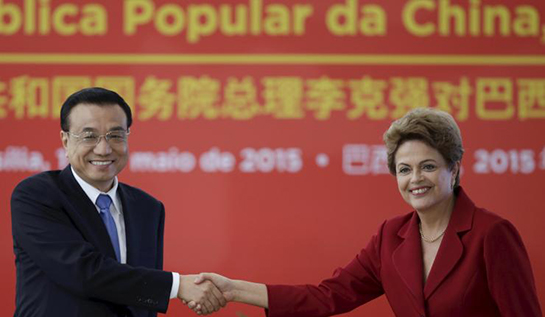Gallagher on NPR, Financial Times, AP
Kevin Gallagher, Associate Professor of Global Development Policy at the Frederick S. Pardee School of Global Studies, said that China would play a crucial role in the development of Latin American infrastructure, after an agreement between China and Brazil to collaborate on a rail link between the Atlantic and Pacific Oceans in South America.
Gallagher made the argument in a number of May 19 news outlets, including an op-ed in the Financial Times entitled “Latin America Needs China to Close Infrastructure Gap.”
From the text of the op-ed:
According to research by the IMF, although the China-led commodity boom was among the longest and most lucrative in the region’s history, most Latin American countries saved less of these windfalls than they have in past booms. This year’s annual report from the Economic Commission for Latin America and the Caribbean adds that Latin American governments also failed to bring in new tax revenue in proportion to the windfalls as well.
It is thus no surprise that the region did little to invest into export competitiveness in sectors other than commodities. Over 78 per cent of Latin American manufacturing exports have lost global market share to their counterparts since 2003.
You can read the entire op-ed here.
Gallagher also appeared on the NPR program “On Point with Tom Ashbrook” to discuss the topic of Chinese rail in Latin America. You can hear the entire interview here.
Gallagher also spoke with the Associated Press on the topic for the article “Chinese PM Starts South American Investment Tour.”
From the text of the article:
The stop in Brasilia is the premier’s first on a four-nation South American tour that includes Chile, Peru and Colombia. It comes as the continent feels the pinch of lessening Chinese demand for its commodities.
“We’re moving into a different era, because China’s economy is transforming to being consumer based and it’s slowing down, so commodity prices are going down,” said Kevin Gallagher, professor of international relations at Boston University with expertise in China’s ties to Latin America. “Chinese trade and investment was Latin America’s best friend for a decade, and now everybody is in a panic.”
Gallagher also spoke to the International Business Times about the deal, already being referred to as the Twin Ocean Railroad, in an article entitled “China, Brazil, Peru Eye Transcontinental Railway Megaproject.”
From the text of that article:
There are high financial hopes for the deal. China, currently facing an economic slowdown, would be able to access raw materials more efficiently and at a lower cost if the railway is successfully completed. It could also be a major boost to Latin America’s sluggish economies, said Kevin Gallagher, an associate professor of global development policy at Boston University who has focused on the China-Latin America relationship.
“Latin America will benefit the most if this is done right,” he said. “High-speed rail could help get products to the Pacific, which is a growing destination for Latin American exports, but it could also facilitate trade among Latin American countries themselves.”
You can read the full article here.
On May 20, Gallagher spoke to the Boston Globe for their story, “Chinese Premier Starts South American Investment Tour.”
From the text of that article:
The stop in Brasilia is the premier’s first on a four-nation South American tour that includes Chile, Peru, and Colombia. It comes as the continent feels the pinch of lessening Chinese demand for its commodities.
‘‘We’re moving into a different era, because China’s economy is transforming to being consumer based and it’s slowing down, so commodity prices are going down,’’ said Kevin Gallagher, professor of international relations at Boston University with expertise in China’s ties to Latin America. ‘‘Chinese trade and investment was Latin America’s best friend for a decade, and now everybody is in a panic.’’
Gallagher is an associate professor of global development policy at Boston University’s Frederick S. Pardee School of Global Studies, where he co-directs the Global Economic Governance Initiative and the Global Development Policy Program. Learn more about him here.
